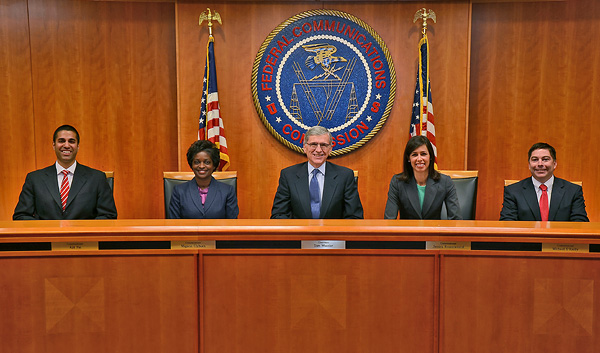FCC Commissioner Pai Discusses 5G Mobile Networks
5G mobile networks are still a ways off, but the FCC is already making plans for the new standard. At the 4G Americas symposium, FCC Commissioner Ajit Pai stated that the transition to 5G would involve a greater amount of FCC intervention than any prior mobile network and also discussed what are the capabilities of the new network.
A number of companies are already working on developing the 5G mobile network standard, but the definition of 5G has not been set yet, and it could provide anywhere from 10 to 50 Mbps of Internet bandwidth with low connection latency of around 1 ms.
"Over a year ago, I visited Samsung's research lab near Dallas, Texas, where engineers are hard at work developing 5G base stations and mobile technologies," Pai said. "Using multiple-input, multiple-output antennas no bigger than a Post-it note, they have already demonstrated that 5G technologies can deliver mobile speeds well in excess of 1 Gbps. More recently, I attended Intel's demonstration of its 5G research at the FCC's headquarters. Intel showed me how it can beam signals off tables, buildings, or other objects to find the most efficient, highest-capacity connection."
Band Spectrum
Companies in the private sector aren't the only ones preparing for the transition to 5G, however, as the FCC is also working on ways to help innovate the 5G standard. A major barrier to increasing mobile Internet performance is the limited band spectrum currently allocated to consumer use. The FCC had plans to widen the mobile Internet spectrum to 300 MHz by 2015, but it has managed to only allocate half of that.
To resolve this problem, Pai identified 12,500 MHz of spectrum available on the 24 GHz, 32 GHz, 42 GHz, 70 GHz and 80 GHz bands, which could be used for mobile Internet. Because of their high frequency, these bands operate with around a 1 mm wave band capable of providing users with plenty of bandwidth. Pai stated that the FCC recently voted against using these bands, but he believes they should be re-examined for mobile Internet use.
Infrastructure & Financing
As the number of users with mobile service plans increases, an important step in supporting 5G networks will be creating networks with greater transmitter density. To achieve this, Pai wants the FCC to officially support network architectures similar to the one Sprint is currently planning, where it will deploy tens of thousands of small transmitters to expand its area of operations and reduce the load placed on any single transmitter.
In order to help motivate companies to invest in these upgrades, Pai believes that the FCC needs to remove regulations that discourage companies from investing in their networks.
Get Tom's Hardware's best news and in-depth reviews, straight to your inbox.
Ready For 5G?
Although 5G networks likely won't be here until 2020, it is important that the FCC is working towards adoption of 5G now. By making plans for the infrastructure, the FCC can ease the deployment of the hardware that will enable 5G networks, and also hasten the development of the standard.
______________________________________________________________________
Michael Justin Allen Sexton (or MJ) is a Contributing Writer for Tom's Hardware. As a tech enthusiast, MJ enjoys studying and writing about all areas of tech, but specializes in the study of chipsets and microprocessors. In his personal life, MJ spends most of his time gaming, practicing martial arts, studying history, and tinkering with electronics.
Follow Michael Justin Allen Sexton @EmperorSunLao. Follow us on Facebook, Google+, RSS, Twitter and YouTube.
-
uglyduckling81 5G could be between 10-50Mbps?Reply
I've received 100Mbps from 4G in Australia. By far the fastest internet I've experienced in Australia and it was wireless. Then go home to my 15/0.8 Mbps ADSL and cry. -
thor220 I can't take anything Ajit Pai says seriously. Dude vigorously opposed net neutrality and his biggest campaign contributors are Verizon and Comcast. I'm sure he'll land a cushy job after being commissioner working for a telecom company.Reply -
IInuyasha74 Reply16901466 said:5G could be between 10-50Mbps?
I've received 100Mbps from 4G in Australia. By far the fastest internet I've experienced in Australia and it was wireless. Then go home to my 15/0.8 Mbps ADSL and cry.
Some of what Commissioner Pai said was a little unclear, but taking the document as a whole, I think what he was trying to say is that 5G is kinda limited to that range at the moment, so development of the standard is locked into that. He talked about the band spectrum more than anything else, and that does have a crucial effect on bandwidth. You have probably noticed in WiFi devices using 5 GHz 802.11 standards are capable of significantly greater bandwidth than the ones locked down to 2.4 GHz. -
IInuyasha74 Reply16901621 said:I can't take anything Ajit Pai says seriously. Dude vigorously opposed net neutrality and his biggest campaign contributors are Verizon and Comcast. I'm sure he'll land a cushy job after being commissioner working for a telecom company.
That is certainly true, he actually makes a strong jab at net neutrality in this, but felt it would have pulled attention away from the real topic of the article to go into it. Either way, just because he does some things we may not approve of, there is still the potential for him to push for beneficial changes to our networks. He seems to be pushing fairly hard for a 5G mobile network with significantly greater performance and coverage here, and I can't see any issues with that. -
jungleboogiemonster Rural areas may never get to take advantage of 5G with the higher spectrums and their shorter ranges. It's highly doubtful carriers will invest in large numbers of transmitters to cover areas serving low numbers of customers. Wireless internet is the only hope for rural regions due to the unwillingness of ISPs to invest anywhere other than high population density areas where profits are highest. It means 20%+ of the US population is left with no or essentially ineffective internet. It's unfortunate that 5G doesn't also include long range high coverage abilities.Reply -
davmazin What is the point of 4G and 5g tech or even 3G if all the networks that use it only allow you to download a very small amount of gbs then you are out of internet, as its there is no point in having this tech for mobile networks if you have a very limited access to data as far as i remember its about 7gb or 8gb at best in the US if you ask me its better just to find a provider that can give you a conection of 50mbps or 100mbps or maybe 1000gbps if you are lucky wireless is pointeless since i dunno any provider that gives unlimited data transfer over its network also its pretty costly for the 7gb or so they giveReply

